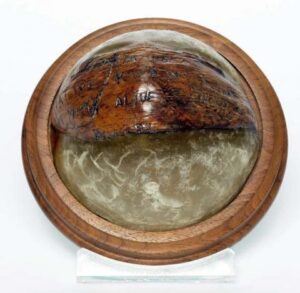Memory, Forgetting, and Accuracy
Drash on Va’etchanan
by Alex Golub
 There’s an old joke about a guy who is sent to prison. He’s terrified to be there and nervously, he sits down with some of the oldest convicts to try to blend in. “18” says one of them, and they all laugh. “23” says another and they all crack up again. “What’s going on?” Asks the new prisoner. “We’ve been telling these jokes for so long we memorized them” says one of the old timers. “Oh really?” says the new guy. He’s real eager to fit in, so he says “9.” No one laughs. Instead, all of the old-timers stare daggers at him. “What did I do?” he asks, panicked. One of the old timers says: “You told it wrong.”
There’s an old joke about a guy who is sent to prison. He’s terrified to be there and nervously, he sits down with some of the oldest convicts to try to blend in. “18” says one of them, and they all laugh. “23” says another and they all crack up again. “What’s going on?” Asks the new prisoner. “We’ve been telling these jokes for so long we memorized them” says one of the old timers. “Oh really?” says the new guy. He’s real eager to fit in, so he says “9.” No one laughs. Instead, all of the old-timers stare daggers at him. “What did I do?” he asks, panicked. One of the old timers says: “You told it wrong.”
Memory is a funny thing. Nothing illustrates this better than our parshah today. On the one hand, Ve’etchanan tells us that we must remember the commandments and that we cannot change them. “Do not forget the things you saw with your own eyes” (Deuteronomy 4:9), it says. “Take care, then, not to forget the covenant” (Deuteronomy 4:23). It tells us to “take care not to forget” (Deuteronomy 6:12). “You shall not add anything to what I command you or take anything away from it” (Deuteronomy 4:2). “Do not turn aside to the right or to the left” (Deuteronomy 6:30). So we must remember the law and we must not change it. That’s the one hand.
But then on the other hand, when Va’etchanan repeats the ten commandments, it isn’t the same ten commandments as in Shmot! In Shmot we are told to ‘remember’ shabbat. In Vaetchanan we are told to ‘observe’ it. Vaetchanan also adds the phrase “as the lord your God has commanded you”. The command to honor your father and mother has been sweetened to include the incentive that if you do so “you may long endure and you may fare well”. In Shmot the sabbath is supposed to memorialize God’s day of rest, in Vaetchanan it is supposed to memorialize the exodus. A bunch of ‘ands’ have been added to the beginnings of commandments seven through ten. In Shmot we are told not to covet our neighbor’s house or his wife. In Vaetchanan we are told not to covet our neighbor’s wife or his house. So we must remember the laws and cannot change them but… we have two versions of the ten commandments? What’s up with that?
 I was thinking about this conundrum this week while also listening to news coverage of the 80th anniversary of the Battle of Guadalcanal, the World War II battle in the Solomon Islands that stopped the Japanese advance in the Pacific. Mindful of China’s growing influence in the Pacific, the US pulled out all the stops for the commemoration, flying several dignitaries to the Solomons, including Cindy Sherman, our deputy secretary of state, and Ambassador Caroline Kennedy.
I was thinking about this conundrum this week while also listening to news coverage of the 80th anniversary of the Battle of Guadalcanal, the World War II battle in the Solomon Islands that stopped the Japanese advance in the Pacific. Mindful of China’s growing influence in the Pacific, the US pulled out all the stops for the commemoration, flying several dignitaries to the Solomons, including Cindy Sherman, our deputy secretary of state, and Ambassador Caroline Kennedy.
The event was personal for Sherman because her father was wounded in the battle. “This is the dreadful cost of war,” Sherman said at the commemoration. “Not only blood and treasure but human souls. As we have lost the Guadalcanal generation to the passage of time we have seen some around the world who seem to have forgotten the awful lessons learned here.”
 The trip was even more personal for Caroline Kennedy, John F. Kennedy’s daughter. She met the descendants of Biuku Gasa and Eroni Kumana, the two Solomon Islanders who helped save her father when his PT boat was sunk by the Japanese. She gave them a replica of the coconut shell which JFK carved his location on, and which he gave to Eroni and Biuku to take to the military authorities. The original coconut shell is still in the JFK Presidential library. JFK had it covered in plastic and used it as a paperweight — it was on his desk in the oval office on the day he was assassinated.
The trip was even more personal for Caroline Kennedy, John F. Kennedy’s daughter. She met the descendants of Biuku Gasa and Eroni Kumana, the two Solomon Islanders who helped save her father when his PT boat was sunk by the Japanese. She gave them a replica of the coconut shell which JFK carved his location on, and which he gave to Eroni and Biuku to take to the military authorities. The original coconut shell is still in the JFK Presidential library. JFK had it covered in plastic and used it as a paperweight — it was on his desk in the oval office on the day he was assassinated.
 Memory, forgetting, and accurate transmission are at the center of these commemorations as much as they are in Parshah Va’etchanan. You can’t remember something that didn’t happen to you. Sherman is wrong to say that our current generation has forgotten the lesson of Guadalcanal — none of us were there. We cannot remember Sinai today. Forgetting is the default in life. It takes a lot of hard work and a lot of teaching to transmit memory from one generation to the next. Like joke number 9 being told wrong, or a replica of a coconut shell covered in plastic, what our children learn from us is always slightly different from what we are trying to teach them. Duplicates and copies proliferate endlessly. If you want, you can go to the store in the JFK presidential library and museum and purchase your own replica of JFK’s coconut shell for only seventy five dollars. Va’etchanan teaches us that we must reconcile our desire for perfect transmission with a world in transmission will never be perfect.
Memory, forgetting, and accurate transmission are at the center of these commemorations as much as they are in Parshah Va’etchanan. You can’t remember something that didn’t happen to you. Sherman is wrong to say that our current generation has forgotten the lesson of Guadalcanal — none of us were there. We cannot remember Sinai today. Forgetting is the default in life. It takes a lot of hard work and a lot of teaching to transmit memory from one generation to the next. Like joke number 9 being told wrong, or a replica of a coconut shell covered in plastic, what our children learn from us is always slightly different from what we are trying to teach them. Duplicates and copies proliferate endlessly. If you want, you can go to the store in the JFK presidential library and museum and purchase your own replica of JFK’s coconut shell for only seventy five dollars. Va’etchanan teaches us that we must reconcile our desire for perfect transmission with a world in transmission will never be perfect.
Of course, we shouldn’t be too content with errors in transmission. When I was in the Solomon Islands, every man I met over the age of sixty confidently informed me that he personally had saved John F. Kennedy. That can’t be right. Luckily, we have writing: to create things that do not change. The Torah itself does not change — we know that its message has remained the same across the centuries. The Torah is a coconut shell covered in plastic, sitting on the president’s desk. But here is the fascinating thing: by giving us two versions of the ten commandments, it unfailingly and permanently shows us that we will always change. Vaetchanan teaches us that we live in a world where drifts in memory are inevitable — even Moses does it. It teaches us that we should not let our desire for perfect transmission make us inflexible. A wise man once said: We are all ancestors in training. What this parshah encourages us to do is to be good teachers. We cannot blame people for not knowing things they haven’t lived through. It’s not fair to blame people for having bad teachers. Instead, we must recognize that remembering requires teaching, and what we choose to teach our students and children is a reflection of our values, culture, and history. They will never perfectly or completely learn the lesson we are teaching, because that is not how teaching works. Instead, we should try to live with the fact that what they make of our memories will always ultimately be up to them. Shabbat shalom.
For more information on the Guadalcanal Commemoration: